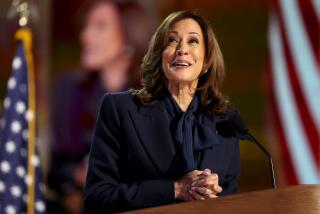Why Jerry Brown will probably never make a fourth try at White House
Jerry Brown will almost certainly never be president of the United States, a fact that disappoints no one so much as Jerry Brown himself.
It’s not for lack of trying. California’s governor has made three attempts at the White House, the first in 1976, scarcely more than a year after taking office. He was 38.
Brown ran and lost a second time in 1980, while in his second term as governor, and again in 1992, campaigning as an insurgent taking on the system’s moneyed interests (a posture long since abandoned by the political wayside).
Those who know Brown and have discussed the matter with him say the Democrat’s presidential ambitions may have dimmed over the last two decades, a reluctant bow to reality, but they have never entirely gone away.
But, alas, from Brown’s perspective, the four-term governor who delivered a combined inaugural and State of the State address last week in Sacramento is no longer considered presidential material, notwithstanding November’s landslide reelection and his stewardship of the nation’s most populous and important state.
The main reason is his age: 76.
If Brown were, say, 10 or more years younger, he would doubtless be in the thick of speculation over the 2016 contest and a serious contender for the Democratic nomination. It’s not hard imagining Monday’s speech serving as his opening salvo. (Instead of live-streaming to eager political insiders in the early-voting states of Iowa and New Hampshire, however, Brown had to settle for national coverage on C-SPAN.)
When he took office, Brown noted, “the state was deep in debt — $26 billion — and our unemployment rate was 12.1%. Now the state budget, after a decade of turbulence, is finally balanced…. California has seen more than 1.3 million new jobs created in just four years, and the unemployment rate has dropped to 7.2%.”
Yes, the state faces billions in unfunded pension and other liabilities that threaten its long-term financial stability, as Brown himself pointed out. And a 7.2% unemployment rate is hardly cause for dancing in the streets. But politicians tend to be graded on a curve and contrasted with those who came before them.
“He can make a pretty good case he’s gotten the state out of the fiscal mess he inherited, which is a good credential for a California Democrat,” said Bill Carrick, a longtime party strategist who worked for Massachusetts Sen. Ted Kennedy’s presidential campaign when Brown made his second try for the White House.
But there are other considerations, besides Brown’s age, that argue against another quixotic tilt at the White House.
He is, after all, only nine years older than Hillary Rodham Clinton, the Democratic front-runner. And if she chooses not to run, it seems highly likely Vice President Joe Biden would jump into the suddenly wide-open fight for the party’s nomination. He’s 72.
One big hurdle facing Brown is the inherent difficulty of running for president and simultaneously serving as California governor. As Dan Schnur, a veteran political strategist now teaching at USC, once put it, “There aren’t any direct flights from Sacramento to Manchester [N.H.], and you can’t run the state from a cellphone at O’Hare [airport].”
He should know. Schnur was part of then-Gov. Pete Wilson’s administration when he waged a spectacularly unsuccessful 1996 run for president. It seems no accident that Ronald Reagan also failed the first time he sought the White House, in 1968, while serving as California governor.
But beyond age and logistical difficulties, there is another factor that has helped force Brown to abandon his White House dreams, apparently once and for all: He is acutely aware of his legacy, according to several who have taken up the subject with him, and is mindful of the damage he would suffer were he to launch another unsuccessful campaign for president.
Instead of being remembered as the governor who brought California back from the brink — a not-insignificant achievement to stack next to those of his legendary father, former Gov. Pat Brown — he would become the Democrats’ Harold Stassen, a onetime political wonder who turned into a campaign punch line.
“California feeds on change and great undertakings,” Jerry Brown said in Monday’s swearing-in speech, “but the path of wisdom counsels us to ground ourselves and nurture carefully all we have started.”
Intended or not, that may be the best explanation Brown ever gives for why he’s staying put in Sacramento.
Twitter: @markzbarabak
More to Read
Sign up for Essential California
The most important California stories and recommendations in your inbox every morning.
You may occasionally receive promotional content from the Los Angeles Times.











